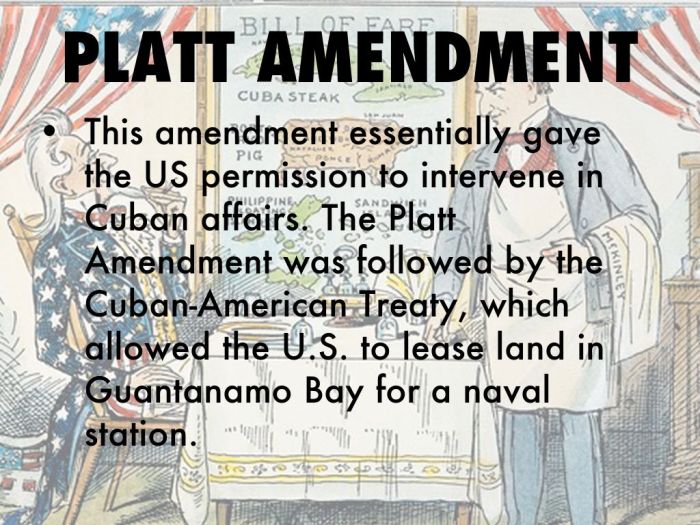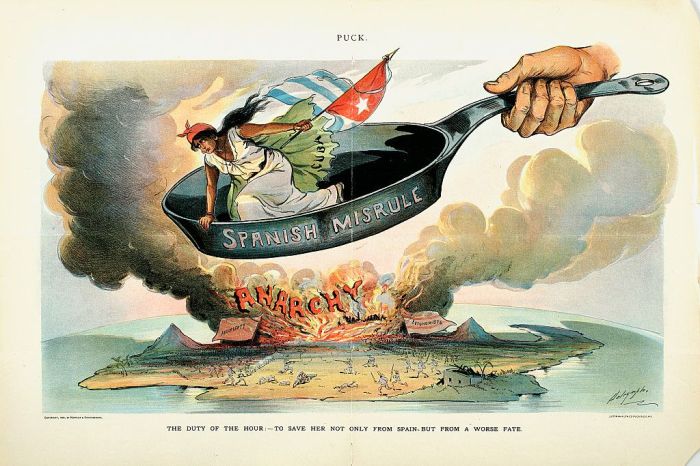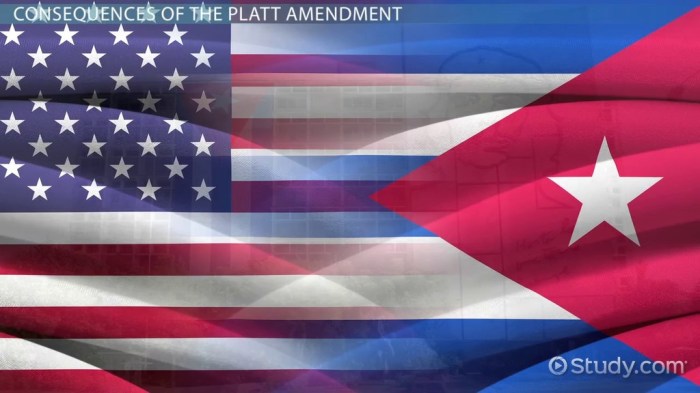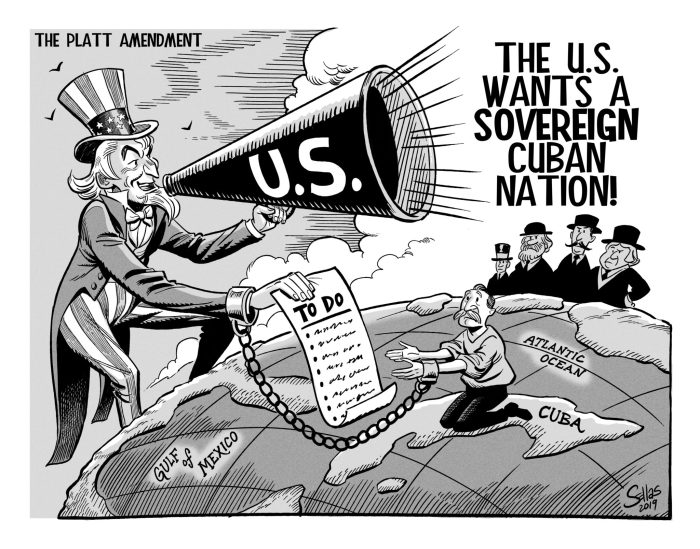Why might the Platt Amendment be considered ironic? This question invites a deeper exploration into the historical document that has left an enduring legacy in US-Cuba relations. The Platt Amendment, enacted in 1901, presents a paradox between its stated goals and its actual impact on Cuba’s sovereignty.
The Platt Amendment, imposed by the United States on Cuba as a condition for withdrawing its troops after the Spanish-American War, aimed to establish a stable and independent Cuba. However, its provisions, such as the right of the US to intervene in Cuban affairs and the establishment of a naval base at Guantanamo Bay, undermined Cuba’s ability to govern itself.
Historical Context

The Platt Amendment was an agreement between the United States and Cuba that was enacted in 1901 as part of the Cuban-American Treaty of Relations. The amendment was designed to ensure the United States’ continued influence in Cuba after the Spanish-American War and the establishment of an independent Cuban government.
At the time, the US-Cuba relationship was characterized by a power imbalance, with the United States holding significant economic and military power over Cuba. The US government was concerned about the potential for European powers, particularly Germany, to gain influence in Cuba, which it saw as a strategic threat to its interests in the Caribbean.
The Platt Amendment was drafted by the US government and presented to Cuba as a condition for the withdrawal of American troops from the island. The Cuban government, which was weak and heavily dependent on the US, reluctantly accepted the amendment.
Provisions of the Platt Amendment: Why Might The Platt Amendment Be Considered Ironic
The Platt Amendment contained several key provisions that limited Cuba’s sovereignty and independence:
- The US had the right to intervene in Cuba to protect its interests and maintain order.This provision gave the US a legal justification for intervening in Cuban affairs whenever it deemed necessary.
- Cuba could not enter into treaties with other countries that might impair its independence.This provision prevented Cuba from forming alliances or agreements with other nations that could threaten US interests.
- Cuba could not sell or lease any part of its territory to any foreign power.This provision prevented Cuba from granting concessions to other countries that could potentially give them a foothold on the island.
- The US could establish naval bases in Cuba.This provision gave the US a permanent military presence in Cuba, which further limited Cuba’s sovereignty.
Irony of the Platt Amendment

The Platt Amendment has been criticized as ironic because its provisions contradicted its stated intentions. The amendment was supposed to ensure Cuba’s independence, but in reality, it made Cuba a de facto protectorate of the United States.
For example, the provision that allowed the US to intervene in Cuba to protect its interests was used repeatedly to justify US interventions in Cuban affairs, including the Spanish-American War, the Platt Amendment itself, and the Cuban Missile Crisis.
The provision that prevented Cuba from entering into treaties with other countries that might impair its independence was also ironic, as it effectively prevented Cuba from conducting an independent foreign policy.
Consequences of the Platt Amendment

The Platt Amendment had a profound impact on Cuba’s political, economic, and social development.
Politically, the amendment undermined Cuba’s sovereignty and independence, making it difficult for the Cuban government to govern effectively.
Economically, the amendment allowed the US to control Cuba’s economy, which led to the development of a dependent economy that was heavily reliant on the US.
Socially, the amendment created a climate of fear and mistrust between Cuba and the US, which made it difficult for the two countries to develop a cooperative relationship.
Legacy of the Platt Amendment

The Platt Amendment was repealed in 1934, but its legacy continues to shape US-Cuba relations.
The amendment is often seen as a symbol of US imperialism and interventionism in Latin America.
The amendment has also been used as a justification for the US embargo against Cuba, which has been in place since 1960.
Detailed FAQs
Why was the Platt Amendment enacted?
The Platt Amendment was enacted to establish a stable and independent Cuba after the Spanish-American War.
What were the key provisions of the Platt Amendment?
The Platt Amendment gave the US the right to intervene in Cuban affairs and establish a naval base at Guantanamo Bay.
How did the Platt Amendment affect Cuba’s sovereignty?
The Platt Amendment limited Cuba’s ability to govern itself by giving the US the right to intervene in its affairs.